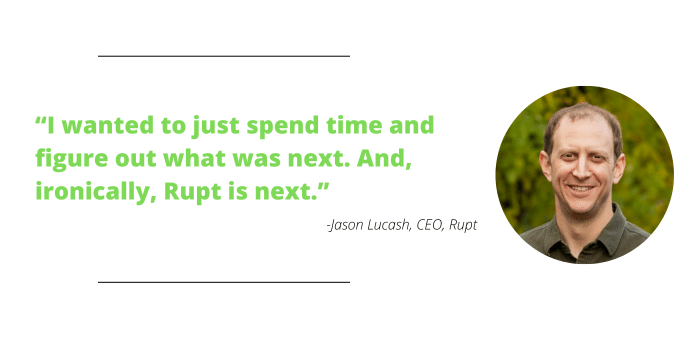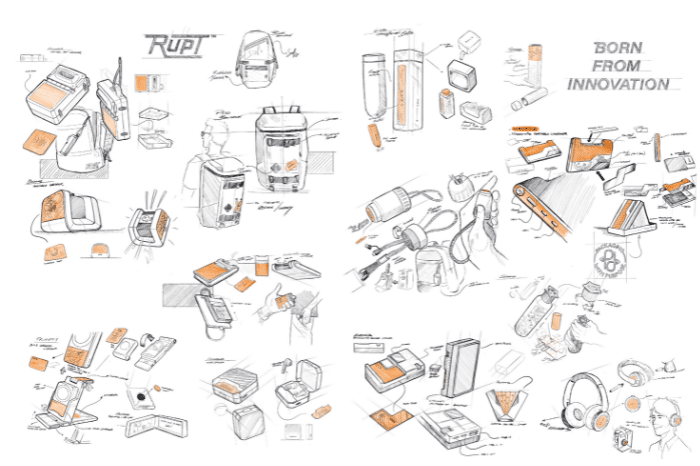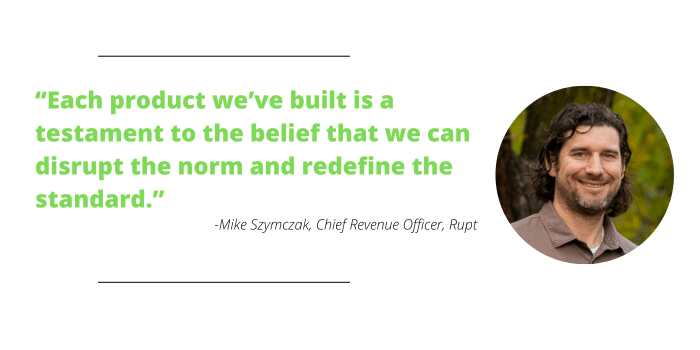The biggest open secret in the promotional products industry is a secret no more: Jason Lucash and Mike Szymczak are officially back in business.
This time they know what they couldn’t have known through the co-founding, scaling and exiting of their previous supplier, Origaudio, which they sold to HPG in 2018.
They have reputations they didn’t have the first time around. Connections. Capital. Vision for a bigger impact.
The products still have to be sold, and the orders have to be fulfilled. But Lucash and Szymczak believe their new venture is destined to succeed in a major way. They see the project as part of a movement that will redefine and disrupt the industry.
That’s why they’re calling it Rupt (PPAI 826757, S1).
Promo’s Newest Supplier
As of this article’s publishing on Monday morning, setup is underway on The PPAI Expo trade show floor. After the floor opens on Tuesday, booth #1019 is likely to be of particular interest for curious distributors. The first line of Rupt products will be on exhibit.
The launch includes 30 industry staples spanning technology, drinkware and backpacks. The entire line is made from recycled materials, marking a first for an industry company. Recycled plastic, recycled stainless steel, recycled polyester and more come together in futuristic designs.
The packaging is also engineered for sustainability, as each product box is created to transform into something useful unto itself. The Jouncer isn’t merely an 80-watt speaker, but a “gateway to audio euphoria,” as Rupt’s catalog puts it, and its packaging can transform into a desk clock. The company calls the Spiglo not just a 750 ml stainless steel drinkware piece, but “the pinnacle of sophistication in hydration,” and its packaging converts into a bird feeder.
Everything is carbon neutral, with promises of supply chain transparency; in another industry first, Rupt vows to disclose the full build of materials and the total recycled percentage by weight for every product.
Rupt also says it will achieve an impressive 48-hour turnaround for U.S. orders, less than a week in Central Europe and the Asia-Pacific region, and the minimum order is one.
There’s quite a bit more.
There’s Rupt Ventures, a side play that will pour VC money into a stable of other suppliers. Two deals have been cut already and are expected to be announced in early 2024.
There’s the plan to buy an actual forest, an asset on the books and a place to plant trees, maybe in Virginia or Tennessee, to achieve true carbon offsetting rather than rely on the purchase of carbon credits. Rupt aims to become a Certified B Corporation when it is first eligible in 2025.
There’s a full five-year financial roadmap, developed with help from a big four accounting firm, to support expanded staffing, more new products and investments.
It keeps going, and it’s all been laid out just so. To think, Lucash and Szymczak were supposed to be retired.
Free To Compete
Nobody really believed the guys would take up oil painting.
Lucash’s time as HPG’s chief development officer ended in February 2022. Szymczak remained in his development and sales management role there until last August. Their five-year non-compete agreements with HPG expired in September 2023, which is when Rupt was officially founded.
“I wanted to just spend time and figure out what was next,” Lucash says. “And, ironically, Rupt is next.”

HPG CEO Chris Anderson was among the first to hear about it from Lucash, who resigned from his position on HPG’s board of directors.
“I was stressed going into the conversation because I have a ton of respect for Chris and care a lot about HPG. I care about my investment in HPG, still in privately held stock, and most importantly I care about my first baby, you know. I care deeply about what Mike and I built at Origaudio.”
Anderson, a PPAI board member, declined to comment for this article.
“HPG is a dominant force within the industry and I hope they continue to grow and succeed.… I don’t want to directly compete against anyone at HPG,” Lucash says. “I am going to, by nature, because I’m doing something that no one has ever done in the promo space. So, by nature, I’m going to compete with everybody, and everyone is going to feel threatened because I’m doing something completely different.”
Lucash had everything pretty well mapped out by the time Szymczak came on board. It’s Lucash’s brainchild, but they’ll build it together, and appear impervious to the jealousies and division that can ruin business partnerships. They are best friends. Szymczak was the best man in Lucash’s wedding. They have worked together in different spots for the last 18 years ever since Szymczak served as an intern under Lucash in a position at Major League Soccer.
Lucash is the CEO, Szymczak is the chief revenue officer. But the two describe Szymczak’s role with an acronym: MSHADED, for Make [Stuff] Happen All Day Every Day.
“Out of the gates we know who’s going to be responsible for what, who has strengths in each business category as well,” Szymczak says. At Origaudio it took them a while to learn how to divide and conquer.
“After like two years, it was definitely separation of responsibility. Let’s stop working on the same thing, and get efficiencies in place, and just trust. Obviously trust is through the roof when you have a business partner in a business the size of which we’re attempting to grow again and that we already did have. So, we just have to trust each other that we’re all rowing the boat in the same direction,” Szymczak says.
Starting From Scratch
Trust is vital not just between Lucash and Szymczak, but in the earliest hires. They’ve recruited Quinn Bui, a 2023 PPAI Rising Star, to close his multi-line rep company and come on as the national sales manager. Monday is his first official day on the job.
“What drew me to Rupt was Mike and Jason,” Bui says. “I have followed them through my career and observed their inspiring journey and success. After a hiatus, seeing them come back with a mission to disrupt and redefine the industry standards excites me.”
Wayne Matthews, the operations manager of the duo’s former Origaudio facility In California, has been hired as general manager of Rupt’s production site in Austin, Texas (the company is also launching with decoration facilities in Portugal and Hong Kong). Others from the industry joining the company include Shacori Valentine, most recently of Makers Garments, to handle East Coast accounts, Allison Theisen, previously of Zing, for the West Coast. Kia Robson, also of Zing previously, will be Rupt’s account experience manager.
Hiring is expected to ramp up significantly in the coming weeks and months.
For most of Rupt’s infancy to this point, the only staffer was Buenos Aires-based Ignacio Tomas Vera Salama, Rupt’s design director, who oversaw the creation of products, starting with sketches, then virtual prototypes and finally physical prototypes. But like everything else at Rupt, these early activities were made with a long-term vision front and center.

“As I looked ahead, planning for scalability and potential expansion was also a key aspect of my role, keeping in mind the long-term growth and impact of our brand in the industry,” Vera Salama says. He cites creativity, practicality and strategic planning as crucial to developing products that give Rupt a chance to establish a unique presence in the market.
The small team’s effort just to get to this week, to have the chance for a splashy debut at the industry’s most important trade show, have clearly been Herculean. Whether it’s staffing, design, marketing, hunting for real estate to establish the facilities, or 1,000 other things, Szymczak and Lucash have both been MSHADEDing.
“People don’t understand the magnitude of it,” Lucash says. “Especially – we’re not just a startup – we’re trying to launch at like a mid-tier kind of business level, as well, from a revenue standpoint.”
Before the products could even be conceived of, there was the period of trying to define what the brand should be. Lucash created a consumer deck to identify the target buyer, where that person shops, their lifestyle, even where they go on vacations. That informed the marketing development, the color scheme, the logo, the website and on and on. Lucash says, “It’s kind of like a polished industrial hipster that has great taste and cares about product quality, is how you’d probably summarize the actual brand voice.”
Although Szymczak says the startup hustle has him “in my happy place,” it’s been a grind. “I’ll work hard and so will Jason,” he says. “There’s just not enough hours in the day.”
The aggressive timeline was defined by the desire to launch at The PPAI Expo. “It’s way less time than I would have liked from September to now,” Lucash says. “But we said, you know, let’s at least get this done on the biggest stage, the Super Bowl of promo at The PPAI Expo, and it get in front of everyone that we know on a grand scale. Some stuff will be held together with Scotch tape and glue behind the scenes, but we at least want to have stuff ready so we can take orders and start having product ready to sell and market.”
Motivating Factors
It should go without saying that Lucash and Szymczak have a lot on the line here – not just the effort and time away from their families, but “millions and millions of dollars” of their own money, hard earned through the journey and sale of Origaudio, which they launched on a budget in the tens of thousands back in 2009.
They aren’t alone. Some of the work in recent months has been to court seed investment from friends and family, venture funds and private investors both inside the industry and outside of it. Rupt keeps its investor information private, but it does seem that a lot of people are betting on the new company to achieve a breakthrough.
Competitive allegiances and unwritten rules of the supply chain will be difficult for some traditionalists in the industry to put aside. Not everyone is going to like it. But it’s arguable that the promise of Rupt and companies like it could be a force for positive change across the promotional products industry. It could mean good things for the planet.
In terms of sustainability and transparency, the guys are thinking about it on the scale of a revolution.
“Rupt emerged from the recognition that change is imperative,” Lucash says in a statement announcing the company’s launch in Las Vegas. “Rupt is not just a response to existing gaps; it’s a deliberate stride toward a more dynamic, forward-thinking promotional industry.”
Buyers, of course, will need to pay for having this level of eco consciousness so wound into everything the company does. As evidenced by their immediate commitment to Europe and the Asia-Pacific markets, Lucash and Szymczak believe the world is ready for promotional products that aren’t the cheapest options.
“Rupt isn’t just a choice; it’s an investment in a future where innovation goes hand in hand with sustainability,” Szymczak says in the statement. “Partnering with Rupt isn’t a transaction; it’s a profound alignment with impactful values and a genuine commitment to the planet’s well-being. Each product we’ve built is a testament to the belief that we can disrupt the norm and redefine the standard.
“With Rupt, you’re not just buying into a brand; you’re becoming part of a movement and most importantly aligning yourself for the next generation of the promotional products industry.”

The grandiose claims would be easy to chalk up as hype, but Lucash and Szymczak have already disrupted the industry once. A decade ago they made Origaudio the fastest growing supplier in the industry by pushing the bounds of production capabilities. They offered no minimums, five-day turnarounds and more.
“When we did it, we were first,” Lucash says. “No one else was doing it. People thought we were crazy. We were printing one at a time in really funky retail packaging. People turned their heads, but as more and more suppliers kind of latched onto that model, it caused the industry to kind of push the limits of speed and decoration even further.”
The investments Lucash and Szymczak will make through Rupt Ventures – the VC play – reveal part of the wider vision. They’ll help up-and-coming suppliers that have likeminded vision. Lucash refers to the fund as a potential “guiding light” in the industry.
“A lot of these companies have tremendous untapped potential,” Szymczak says.
And the ability to share knowledge and resources with the leaders behind those businesses creates some advantages, and potential product bundling opportunities. There are layers.
Rolling The Dice
Speaking to PPAI Media in November, Szymczak alluded to a six- or seven-year run with Rupt. Lucash acknowledges the potential of acquisitions as well. It’s early, considering they have yet to record their first official sale.
If everything goes according to their plan, this will grow into a PPAI 100 caliber business quickly and earn a spot in the top 50 suppliers by revenue in five or six years. And will they rinse and repeat with another lucrative exit? Wait out their non-competes and come back to do it all again with another new concept?
Again, too early for all that.
There are risks here, obviously. “The economic uncertainty is the big one,” Lucash says. “I’m coming into rough global economic waters and selling higher price-point goods, which to my knowledge in down economies, higher priced goods don’t typically sell well, so that’s a big risk. People, economic uncertainty, World War III, a soft market, losing a lot of money… as an an entrepreneur you have to roll those dice, man. That’s why I love playing craps.”
Rupt may succeed, or it may not. No one can say. But it seems destined to make its impact felt.
It might push competitors to meet its impressive production promises. It might encourage more to lean further into sustainability and transparency. Whatever happens is bound to be loud and intense.
It’s going to be a big show.


